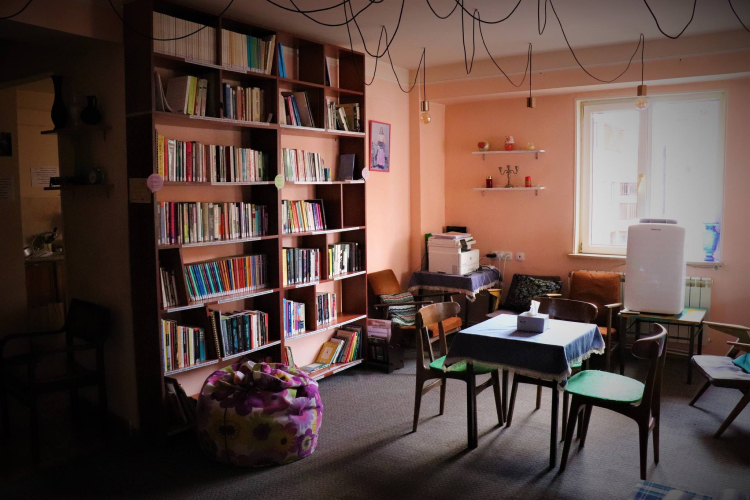Picture: FemLibrary Armenia, a queer feminist collective, imagination and space in Yerevan, 2024 (c) FemLibrary Armenia
How should one navigate political subjectivity in research encounters and collaborations? Or respond ethically to knowledge hierarchies in joint data collection and evaluation processes? These are some of the methodological and ethical questions I have been asking myself within the framework of my doctoral research project, currently titled Concepts, Ideologies, and Emotions: Taking Stock of the New Left in the South Caucasus. As part of this project, I have talked to leftists or left-leaning individuals of different ages (so far mostly in Georgia) in one-on-one settings, sometimes for many hours. Currently, I have the chance to implement my sub-project on Young left-wing women in Armenia in collaboration with the Caucasus Research Resource Center (CRRC), Armenia an independent Yerevan-based research institute that ‘addresses national and regional socio-economic and political challenges via high-quality data collection and presentation.’
Reflexivity plays a central role in my projects, be that in data collection, selection, or interpretation. It is significant for both my own position in relation to myself as a researcher and in interactions with research partners and participants. Reflexivity is both critical and problematic. It is problematic because it can privilege certain perspectives and narratives, thus potentially reproducing unequal power configurations. It is critical because it can at times challenge hegemonic, oppressive, or unethical interpretations. As Philipp Lotholz and Karolina Kluczewska (2024: 21) argue, reflexivity can enable researchers, albeit in a small way, to intervene in ‘the political economy of knowledge production.’
Mapping reflexivity: From confessional introspection to social critique
The psychologist and psychotherapist Linda Finlay proposes a five-fold heuristic framework to illustrate different approaches to reflexivity and move it beyond positionality: introspection, intersubjective reflection, mutual collaboration, social critique, and discursive deconstruction. Following Finlay, I want to bring forward two arguments, both of which are rooted in my research experiences and specific to my doctoral project: the first concerns the disclosure of one’s own political subjectivity during data collection; the second is about the shift from reflexive introspection to social critique.
Disclosing one’s political subjectivity in relation to a research topic is ethical but not always feasible – particularly in contexts of personal insecurity, as in the case of research in authoritarian states or in time of war. However, when feasible, it allows potential participants or co-researchers to make informed decisions about whether they wish to engage with the research project. Social research takes place in a specific political context, a complex and fluid landscape of ambivalent and contested ideologies.
While one’s position may evolve over time, being transparent about one’s current ideological standpoint during research encounters reflects an honesty vis-à-vis your research interlocutors. Moreover, this transparency can foster constructive knowledge production as a co-creative process. Such knowledge production is not only scholarly but also has the potential to be socially engaging.
Reflexive introspection sections in social studies often assume a confessional tone, disclosing, for example, one’s own privileged position in research as a kind of ‘guilt notification’ or outlining the power dynamics between oneself and one’s interlocutors or colleagues in the field. While introspective reflections on positionality and challenging experience warrant attention in research publications, they are insufficient when aiming for what we might call an ethics of reflexivity. Here, I draw on historical sociologist and social theorist Gurminder Bhambra’s concept of ‘reparatory social science’. Her ambitious approach seeks to contribute to addressing ‘the inadequacies that have become entrenched in our disciplines [primarily social science]’ and suggests that we ‘work […] towards a project of repair and transformation […]’ (2022: 8). Bhambra emphasises the importance of recognizing difference rather than focussing solely on commonalities; I interpret this as a call to illustrate multiple voices rather than representing a single perspective. For example, the term left-wing, which is central to my project, can be deconstructed in various ways to reveal ‘the ambiguity of meanings in language’ (2022: 222), which expresses the various understandings of left-wing we bring to our research.
Collaboration in action: Knowledge hierarchies and context-specific ethical frameworks
For me, acknowledging difference is particularly important in research collaborations and encounters with participants – in my case, these are primarily cooperations with interlocutors and colleagues in Armenia, Azerbaijan and Georgia.
Such an approach puts the main emphasis on research subjects, takes their self-understanding seriously, and attempts to move beyond a paternalistic relationship between ‘researcher’ and ‘researched.’ It is what the social philosopher Robin Celikates calls a ‘critique as social practice’. Similarly, Finlay (2002: 222) states that critique is an offer ‘to utilise experiential accounts while situating these within a strong theoretical framework about the social construction of power.’
How can this look in practise when it comes to research collaborations with third parties? It would mean power sharing and recognition of all research participants, clearly specifying which actors performed which tasks in the research process and acknowledging (instead of concealing) the advantages and limitations faced by researchers themselves. In my case, the experiences of my interlocutors, informal conversations with colleagues, and the current outsourcing of tasks to colleagues are indispensable to my research process and results. It was, for instance, the ongoing collaboration with my colleagues at CRRC Armenia that allowed me to gain knowledge about which formulations are problematic in focus groups given Armenia’s post-war context.
Therefore, when third parties are involved in data collection, these contributors must be clearly acknowledged in publications. The same applies to inter-institutional hierarchical constellations. These details should be included in the methodology sections, and depending on the nature of the collaboration, research assistants could be recognised as co-authors.
Nevertheless, as Lottholz and Kluczewska recognise, cooperative research has its limitations when the goals and desires of different research parties diverge. However, instead of shying away from cooperation, the advocate continuous engagement with contradictions in research and propose to anchor debates on research ethics and cooperation ‘in academic curricula and institutional environments.’
Such approaches are possible and necessary before talking about ‘participatory methods’ in a process that would involve long-term and constant engagement with actors. In addition to being open while in contact with colleagues and interlocutors, disclosure in publications and power sharing in collaborative research could contribute to turning the critique into social practise.
Author
 Veronika Pfeilschifter is a social scientist with a background in political science, European ethnology and Central, East European, Russian and Eurasian (CEERES) studies. She is currently a doctoral researcher at the Institute for Caucasus Studies at Friedrich Schiller University Jena (FSU) Jena and a research affiliate at the Centre for East European and International Studies (ZOiS) Berlin. Her academic interests include politics and society in the South Caucasus, the (new) left, political subjectivity, emotions, and critical social theory.
Veronika Pfeilschifter is a social scientist with a background in political science, European ethnology and Central, East European, Russian and Eurasian (CEERES) studies. She is currently a doctoral researcher at the Institute for Caucasus Studies at Friedrich Schiller University Jena (FSU) Jena and a research affiliate at the Centre for East European and International Studies (ZOiS) Berlin. Her academic interests include politics and society in the South Caucasus, the (new) left, political subjectivity, emotions, and critical social theory.
Veronika would like to thank RK for their insightful recommendations regarding this article.

